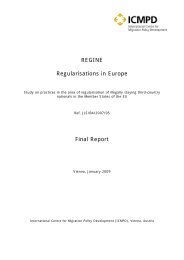European Union Enlargement - An historic opportunity
European Union Enlargement - An historic opportunity
European Union Enlargement - An historic opportunity
You also want an ePaper? Increase the reach of your titles
YUMPU automatically turns print PDFs into web optimized ePapers that Google loves.
<strong>An</strong>nexes<br />
ASSOCIATION AGREEMENT<br />
Contractual framework of the relationship between the EU and Cyprus, Malta, and Turkey. The<br />
Association Agreements with each of these countries cover trade-related issues and various other areas<br />
of co-operation. They aim gradually to establish a customs union between the <strong>European</strong> Community and<br />
each of the countries concerned. In the case of Turkey, this objective was achieved in 1995, with the<br />
entry into force of the Customs <strong>Union</strong> Agreement.<br />
COPENHAGEN CRITERIA<br />
Agreed in 1993 by the <strong>European</strong> Council, the Copenhagen criteria must be fulfilled by candidate countries<br />
if they are to become members. They must achieve stability of institutions guaranteeing democracy,<br />
the rule of law, human rights and respect for and protection of minorities; the existence of a functioning<br />
market economy as well as the capacity to cope with competitive pressure and market forces within<br />
the <strong>Union</strong>; and the ability to take on the obligations of membership including adherence to the aims of<br />
political, economic and monetary union. The Luxembourg <strong>European</strong> Council (December 1997) also<br />
underlined that “as a prerequisite for enlargement of the <strong>Union</strong>, the operation of the institutions must<br />
be strengthened and improved in keeping with the institutional provisions of the Amsterdam Treaty”.<br />
EUROPE AGREEMENT<br />
Basic legal instruments of the relationship between the EU and the ten associated countries of Central<br />
and Eastern Europe. The Europe Agreements cover trade-related issues, political dialogue and various<br />
other areas of co-operation. They aim gradually to establish free trade between the EU and the associated<br />
countries. Since the Luxembourg <strong>European</strong> Council in December 1997, the institutions of the Europe<br />
Agreements have assumed an enlarged role in the enhanced pre-accession strategy. They monitor the<br />
overall progress made by the partner countries: the adoption and implementation of <strong>European</strong><br />
Community legislation and the implementation of the Accession Partnership priorities.<br />
EUROPEAN CONFERENCE<br />
Multilateral framework bringing together the ten Central and Eastern <strong>European</strong> countries, Cyprus, Malta,<br />
and Turkey, to discuss issues of common interest, such as foreign and security policy, justice and home<br />
affairs, regional co-operation or economic matters. This conference met for the first time in London on 12<br />
March 1998 at the level of Heads of State or Government. In December 1999, the Helsinki <strong>European</strong><br />
Council announced a review of the future of the <strong>European</strong> Conference, so as to take account of the evolving<br />
situation. The Nice <strong>European</strong> Council in December 2000 concluded that the countries covered by the<br />
stabilisation and association process and the EFTA countries be invited to attend as prospective members.<br />
With a view to further strengthening the <strong>Union</strong>’s relationship with its near neighbours, the Gothenburg<br />
<strong>European</strong> Council in June 2001 announced that Ukraine and Moldova would also be invited to join the<br />
Conference.<br />
INSTITUTION BUILDING<br />
Institution building involves the adaptation and strengthening of democratic institutions, public administration<br />
and organisations that have a responsibility for implementing and enforcing Community legislation.<br />
The integration process is not simply a question of approximating candidate countries’ legislation to<br />
that of the Community; it is also one of ensuring the effective and efficient implementation of the texts.<br />
This means training and equipping a wide range of civil servants, public officials, professionals and relevant<br />
private sector actors.<br />
ISPA (PRE-ACCESSION INSTRUMENT FOR STRUCTURAL POLICIES)<br />
Pre-accession assistance worth €1,040 million per year since 2000, to be directed mainly towards aligning<br />
the candidate countries of Central and Eastern Europe with Community infrastructure standards in<br />
transport and the environment.<br />
ENLARGEMENT OF THE EUROPEAN UNION, AN HISTORIC OPPORTUNITY<br />
37

















